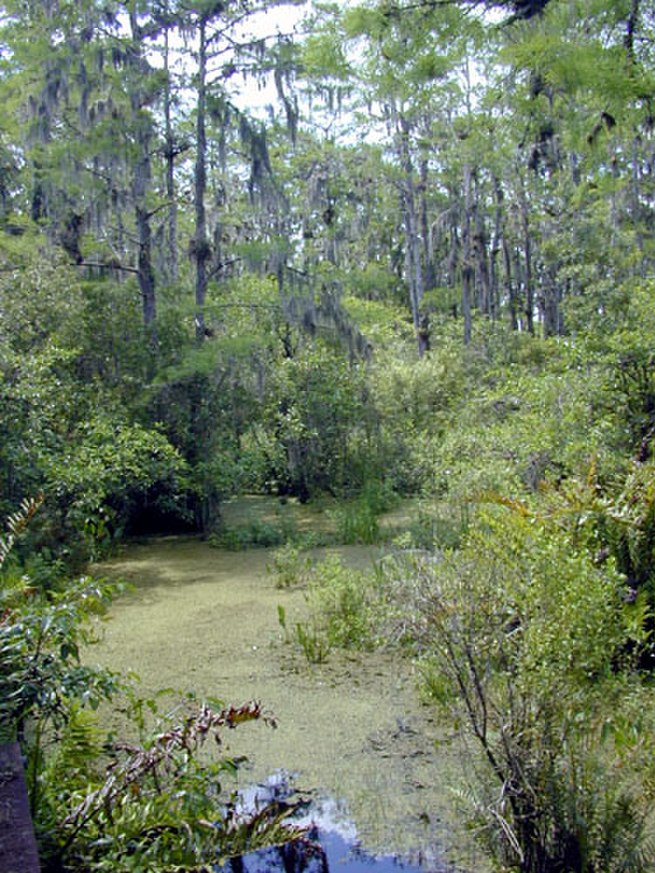
Main Difference
The main difference between Swamp and Bog is that the Swamp is a wetland with trees and Bog is a wetland that accumulates peat due to incomplete decomposition of plant leftovers
-
Swamp
A swamp is a wetland that is forested. Many swamps occur along large rivers where they are critically dependent upon natural water level fluctuations. Other swamps occur on the shores of large lakes. Some swamps have hammocks, or dry-land protrusions, covered by aquatic vegetation, or vegetation that tolerates periodic inundation. or soil saturation. The two main types of swamp are “true” or swamp forests and “transitional” or shrub swamps. In the boreal regions of Canada, the word swamp is colloquially used for what is more correctly termed a bog, fen, or muskeg. The water of a swamp may be fresh water, brackish water or seawater. Some of the world’s largest swamps are found along major rivers such as the Amazon, the Mississippi, and the Congo.
-
Bog
A bog or bogland is a wetland that accumulates peat, a deposit of dead plant material—often mosses, and in a majority of cases, sphagnum moss. It is one of the four main types of wetlands. Other names for bogs include mire, quagmire, and muskeg; alkaline mires are called fens. They are frequently covered in ericaceous shrubs rooted in the sphagnum moss and peat. The gradual accumulation of decayed plant material in a bog functions as a carbon sink.Bogs occur where the water at the ground surface is acidic and low in nutrients. In some cases, the water is derived entirely from precipitation, in which case they are termed ombrotrophic (cloud-fed). Water flowing out of bogs has a characteristic brown colour, which comes from dissolved peat tannins. In general, the low fertility and cool climate result in relatively slow plant growth, but decay is even slower owing to the saturated soil. Hence, peat accumulates. Large areas of the landscape can be covered many meters deep in peat.Bogs have distinctive assemblages of animal, fungal and plant species, and are of high importance for biodiversity, particularly in landscapes that are otherwise settled and farmed.
-
Swamp (noun)
A piece of wet, spongy land; low ground saturated with water; soft, wet ground which may have a growth of certain kinds of trees, but is unfit for agricultural or pastoral purposes.
-
Swamp (noun)
A type of wetland that stretches for vast distances, and is home to many creatures who have adapted specifically to that environment.
-
Swamp (verb)
To drench or fill with water.
“The boat was swamped in the storm.”
-
Swamp (verb)
To overwhelm; to make too busy, or overrun the capacity of.
“I have been swamped with paperwork ever since they started using the new system.”
-
Swamp (verb)
To plunge into difficulties and perils; to overwhelm; to ruin; to wreck.
-
Bog (noun)
An area of decayed vegetation (particularly sphagnum moss) which forms a wet spongy ground too soft for walking; a marsh or swamp.
-
Bog (noun)
Confusion, difficulty, or any other thing or place that impedes progress in the manner of such areas.
-
Bog (noun)
The acidic soil of such areas, principally composed of peat; marshland, swampland.
-
Bog (noun)
A place to defecate: originally specifically a latrine or outhouse but now used for any toilet.
-
Bog (noun)
An act or instance of defecation.
-
Bog (noun)
A little elevated spot or clump of earth, roots, and grass, in a marsh or swamp.
-
Bog (noun)
: a bugbear, monster, or terror.
-
Bog (noun)
Puffery, boastfulness.
-
Bog (verb)
To sink or submerge someone or something into bogland.
-
Bog (verb)
to prevent or slow someone or something from making progress.
-
Bog (verb)
To sink and stick in bogland.
-
Bog (verb)
To be prevented or impeded from making progress, to become stuck.
-
Bog (verb)
To defecate, to void one’s bowels.
-
Bog (verb)
To cover or spray with excrement.
-
Bog (verb)
To make a mess of something.
-
Bog (verb)
To provoke, to bug.
-
Bog (verb)
To go away.
-
Bog (adjective)
Bold; boastful; proud.
-
Bog (noun)
an area of wet muddy ground that is too soft to support a heavy body
“a peat bog”
“the island is a wilderness of bog and loch”
“a bog of legal complications”
-
Bog (noun)
wetland with acid peaty soil, typically dominated by peat moss.
-
Bog (noun)
the toilet.
-
Bog (verb)
be or become stuck in mud or wet ground
“the family Rover became bogged down on the beach road”
-
Bog (verb)
be prevented from making progress in a task or activity
“you must not get bogged down in detail”
-
Bog (verb)
go away
“I told him to bog off”
-
Bog (verb)
start a task enthusiastically
“if he saw a trucker in difficulty, he would just bog in and give a hand”
